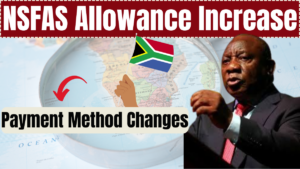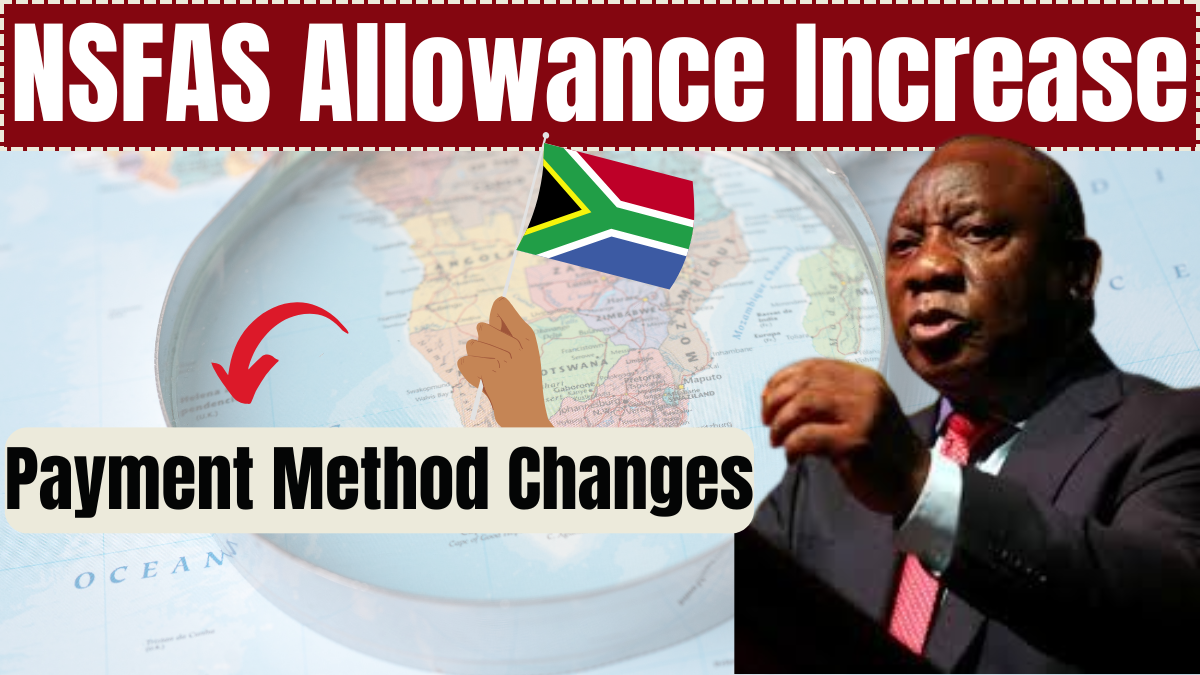In April 2025, South African students supported by the National Student Financial Aid Scheme (NSFAS) are set to benefit from a revised allowance structure. After ongoing concerns over rising living costs and financial stress, this boost in financial aid arrives as a crucial intervention. With the increase, students will have access to expanded coverage for essentials such as housing, meals, transport, and learning materials. Below is a complete guide to the latest updates, allowance amounts, and what these changes mean for university and TVET college students.

Overview of NSFAS Allowance Categories and Updates in 2025
| Category | 2025 Allowance Details | Amount or Note |
|---|---|---|
| Accommodation Allowance | Based on type and location of accommodation | Capped by institution |
| Living Allowance | Offered to students in private accommodation | Daily expense support |
| Learning Materials Allowance | For books, devices, and academic materials | Based on course need |
| TVET College Allowance | Annual support increase from R10,000 to R14,600 | 46% increase |
| University Payments | Disbursed through universities | Direct bank delays |
| TVET Payments | Sent directly to student bank accounts | Faster and secure |
Official Confirmation of NSFAS 2025 Increase
The NSFAS administration has officially approved the increase in allowances for the academic year 2025. According to Freeman Nomvalo, the NSFAS Administrator, this move reflects the growing need to support students amid challenging economic conditions. Deputy Minister of Higher Education, Dr. Nobuhle Nkabane, added that the decision was based on inflation and the widening gap between income and living expenses. While most students will see a 4% increase, those in TVET colleges will benefit from a significant 46% jump in support, rising from R10,000 to R14,600 annually.
Detailed Breakdown of NSFAS Allowances in 2025
Accommodation Allowance
Accommodation support is tailored based on the student’s living arrangement:
-
Institution-owned or leased residences receive a capped annual allowance.
-
Private accredited accommodation comes with a separate capped amount.
-
Institution-catered housing includes both accommodation and meal allowances.
-
Health sciences students are granted full 12-month coverage for accommodation, unlike other programs that cover only the academic year.
Living Allowance
Students living in private accommodations are entitled to a living allowance covering essentials such as food and hygiene items. However, this is not available to distance learners enrolled in fewer than 60 credits.
Travel vs. Accommodation
Students may receive only one of the following:
-
Transport allowance for those living at home with family.
-
Accommodation allowance for students staying in approved residences.
Learning Materials
All university students are eligible for a learning materials allowance to help purchase books, study devices, and other educational tools. The amount varies based on what materials are required for their course.
NSFAS Payment Methods: What’s Changing in 2025?
For University Students
University students will continue to receive allowances through their respective institutions rather than through direct bank transfers. Although there were initial plans to shift to a centralized payment system, the rollout has been delayed due to legal complications. For now, payments are scheduled to begin by February 2025, and NSFAS-linked bank accounts will remain temporarily active.
For TVET College Students
TVET college students will benefit from direct payment into their personal bank accounts. This change is intended to speed up the process and reduce delays, ensuring reliable and prompt access to financial aid.
Provisional Funding and Ongoing Process
Roughly 800,000 students have been provisionally funded for the 2025 academic year. However, final approval depends on accurate registration data provided by institutions. Once validated, NSFAS will initiate payment processes accordingly.
The increase in allowances is expected to reduce financial stress and allow students to focus on their academic journey. It’s a meaningful step in the government’s long-term commitment to inclusive and accessible education.
Steps to Track Your NSFAS Application in 2025
If you’re eager to know your application status, follow these steps:
-
Go to the official NSFAS website.
-
Access the “myNSFAS” portal.
-
Sign in using your email and password.
-
Head to the “Track Application Progress” or “Application Status” section.
What Lies Ahead for Students?
The allowance increase brings a welcome shift in the financial support structure. As tuition and cost-of-living pressures continue, this improved support system can play a vital role in a student’s educational success. Still, NSFAS and the Department of Higher Education are working on broader reforms to ease the financial burden for South African students.
FAQs
Is the NSFAS allowance increase confirmed for 2025?
Yes, NSFAS has officially confirmed the increase for the 2025 academic year, including a 46% boost for TVET students.
When will NSFAS payments start in 2025?
University payments are expected to begin by February 2025, while TVET students will receive direct bank payments sooner.
Will the living allowance apply to all students?
No, distance-learning students with fewer than 60 credits are not eligible for the living allowance.
Can I receive both transport and accommodation allowance?
No, students can only receive one — either transport or accommodation support — based on their living situation.
How much is the new TVET college allowance?
The new annual allowance for TVET students is R14,600, up from R10,000 in the previous year.
Click here to know more.
